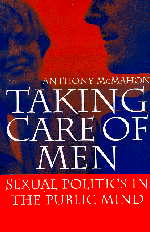

![]()
![]()

The theoretical strength of the book is grounded in work on the domestic/sexual division of labour by the feminist materialists Delphy and Leonard. In Chp.1 McMahon establishes empirically the persistence of marked gender difference in who does the physical and emotional work of caring in the domestic sphere, and explores this through a materialist paradigm in Chp 2. PART II is devoted to analysing the rhetorical devices through which changes in the domestic division of labour and masculinities are socially constructed. Public conversations about men refigure them as sensitive expressive fathers, as narcissistic but domesticated consumers and as equal partners in domestic work. The perceptiveness of his analysis of these forms is that it provides a convincing explanation of the paradox that, whilst empirically relatively little change has taken place in the sexual division of labour in the home, there is an air of optimism about its extent in popular discourses. This optimism comes from the employment of the rhetoric of what he terms 'the revolving door' theory of gender convergence adopted in both sociological and popular accounts of change; as women become more visible in the workplace so men take on more domesticated roles in the home. The moral panic about the emasculated male as well as the applause given to the new caring, sensitive and affective man both give expression to feelings about the changes taking place. As ideological constructions either in sociological discourse or popular culture, McMahon argues, this theory gives the illusion of a process of change more significant than it actually is.
Part III furnishes a parallel treatment to discourses in psychology, especially the contribution that object-relations theory has made to the construction of the rhetoric of the 'wounded male'. He rightly observes that the popularity of this feminist theory, which he terms 'the blocked door' approach is grounded in its appeal to commonsense understanding and material interests. By explaining the problems of masculinity in terms of the trauma of separation from the omnipresent mother, and of the absent father, it constructs men as unwitting victims rather than active aggressors, and it obscures their interests in the status quo. The value of his approach is highlighted when contrasted with Faludi's uncritical endorsement of at least part of the theory as an explanation of how men have been betrayed. Had it appeared earlier 'Stiffed' would no doubt have been incorporated into McMahon's critique of public conversations on men.
The book makes an important contribution because it makes accessible not only analyses of key discourses or public conversations on its subject but it gets to the heart of why, despite the evidence to the contrary, there is such optimism on gender convergence and the decline of gender inequalities. It does this by demonstrating how the constructions of men in the domestic sphere mystify and de-politicize the issues at stake.
Jenny Ryan
Manchester Metropolitan University
